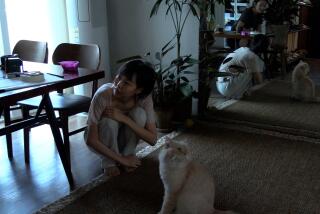MOVIE REVIEW : Odyssey of Self-Discovery in âSong of the Exileâ
âSong of the Exileâ (at Laemlleâs Monica 4-Plex) affords an all-too-rare opportunity to see the work of Hong Kong director Ann Hui, a world-class filmmaker of much passion and bravura, best known for âThe Story of Woo Viet â (1981) and âBoat Peopleâ (1983).
Admittedly autobiographical, âSong of the Exileâ makes clear why Hui identifies so profoundly with individuals responding to the impact of an alien culture. In the first film, one in the action genre, Hui tells of a Chinese-Vietnamese refugee caught up in the Manila underworld; in the second, her hero is an increasingly disillusioned Japanese photojournalist, returning to Vietnam some years after he witnessed the âliberationâ of Da Nang.
At its heart, âSong of the Exile,â beautifully written by Wu Nien-Jen, widely regarded as Hong Kong and Taiwanâs best screenwriter, is a story of a mother (Shwu-Fen Chang) and daughter (Maggie Cheung) and their troubled relationship.
The year is 1973 and the daughter, Hueyin, has just received her M.A. at a London university. Having been turned down for a job at the BBC, she decides to return home to Hong Kong for her younger sisterâs wedding.
Immediately, the extremely conventional mother, long-widowed, and her free-spirited daughter clash. In the increasingly tense atmosphere, the daughter is flooded with memories of happier times when she was a child, growing up in Macao, doted upon by her paternal grandparents.
The heart of the matter is that the mother is in fact Japanese and has struggled for decades to become assimilated in an alien culture. Sheâs in such despair over her clashes with Hueyin that she decides to make her first trip to her homeland in more than 30 years. At loose ends, Hueyin, who did not know about her motherâs true nationality until in her teens, decides to accompany her, much to eachâs surprise.
âSong of the Exileâ is a poignant, bittersweet odyssey of self-discovery and reconciliation. Hueyin has no idea that her mother was so well-born, that she had gone to Japanese-occupied Manchuria (where she met Hueyinâs father) after a broken romance.
Significantly, we now see that the Chinese grandparents who showered such affection on Hueyin treated their Japanese daughter-in-law with scorn. One moment of revelation and understanding follows another for us as well as for mother and daughter, who are learning firsthand what it feels like to be an alien.
Superb in all aspects, âSong of the Exileâ is a prime example of Huiâs formidable storytelling skills. Hui seems to be one of those cinema naturals, for whom everything seems to flow effortlessly. No film maker could be less self-conscious yet few are so sharply and compassionately observant. Her films have an intimacy, an eye for detail that seems feminine, yet Huiâs scope is invariably epic.
âSong of the Exileâ (Times-rated Mature for complex adult themes) has locations in Canton as well as London and Hong Kong and various sites in Japan. This singularly rich and rewarding film makes one eager to see the other seven features Hui has made in addition to âThe Story of Woo Vietâ and âBoat People.â
âSong of the Exileâ
Shwu-Fen Chang: Aiko/Kwei Tzu
Maggie Cheung: Hueyin Cheung
Chi-Hung Lee: Hueyinâs father
Tien Feng: Hueyinâs grandfather
A Kino International release of a COS Films Ltd/ Central Motion Picture co-production. Director Ann Hui. Producers Deng-Fei Lin, Nai-Chung Chou. Executive producer Jessica Liu. Screenplay Wu Nien-Jen. Cinematographer Chung Chi-Man. Editor Yih-Shun Huang. Costumes Shirley Chan. Music Yang Chen. Art director Yee Chung-Man. In Cantonese, Japanese and English, with English subtitles. Running time: 1 hour, 38 minutes.
Times-rated Mature (complex adult themes).
More to Read
Only good movies
Get the Indie Focus newsletter, Mark Olsen's weekly guide to the world of cinema.
You may occasionally receive promotional content from the Los Angeles Times.










